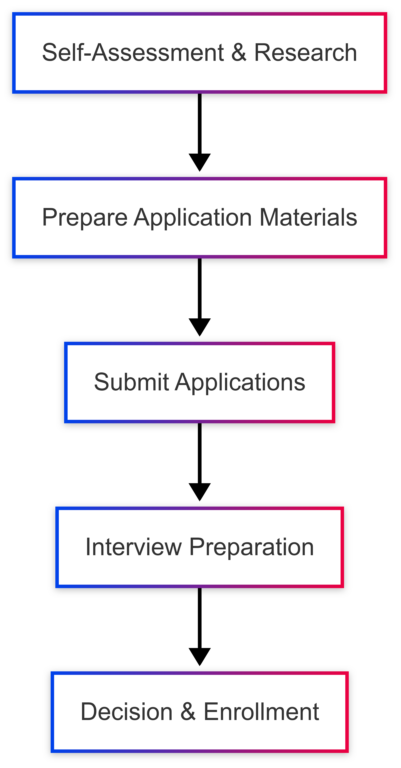[Updated 2025] Graduate School Applications in Counseling & Psychology: The Ultimate Guide

Pursuing a graduate degree in counseling or psychology can be an exciting and rewarding experience, but it requires a significant investment of time, money, and effort. One of the first steps in this journey is navigating the graduate school application process, which can be daunting and overwhelming. Here are some tips to help you navigate the graduate school application process for counseling and psychology:
Why Pursue a Graduate Degree in Counseling & Psychology?
Graduate programs in counseling and psychology offer distinct yet complementary career paths. Consider these key advantages:
- Broadened Impact:
- Counseling: Directly support individuals and groups through therapeutic techniques.
- Psychology: Engage in research, clinical practice, or academic roles to explore behavioral and cognitive processes.
- Diverse Career Opportunities:
- Counseling: Work in private practice, community mental health centers, school counseling, or crisis intervention.
- Psychology: Explore careers in clinical psychology, research institutions, academia, or forensic psychology.
- Interdisciplinary Learning: Gain expertise in mental health, human behavior, and evidence-based therapeutic methods.
- Growing Demand: The increasing focus on mental health has expanded opportunities for skilled professionals in both areas.
Step-by-Step Application Process
Navigating the application process for counseling and psychology graduate programs involves several key steps:
1. Self-Assessment & Program Research
- Identify Your Goals: Determine your career interests and strengths.
- Explore Programs: Compare faculty expertise, curriculum details, research opportunities, and clinical training options.
- Gather Information: Use trusted sources, program websites, and informational sessions to learn more about each school.
2. Gathering Application Materials
- Academic Records & Test Scores:
- Collect transcripts and ensure standardized test scores (such as the GRE or other required exams) are up to date.
- Letters of Recommendation:
- Select recommenders who can detail your academic achievements, research potential, and practical experience.
- Personal Statement:
- Craft a narrative that highlights your passion for counseling or psychology, and outlines your career goals.
- Resume/CV:
- Include relevant work experience, volunteer activities, internships, and research projects.
- Supplemental Materials:
- Provide writing samples, portfolios, or project summaries if required by the program.
3. Application Submission & Tracking
- Review Applications: Double-check each application for completeness and accuracy.
- Track Deadlines: Use a planner or digital tool to monitor deadlines and submission statuses.
- Follow Up: Contact programs to confirm the receipt of your application materials if necessary.
4. Interview Preparation
- Research Common Questions: Prepare for questions specific to both counseling and psychology programs.
- Develop Your Responses: Clearly articulate your academic interests and career objectives.
- Prepare Your Questions: Develop thoughtful questions for the admissions panel about the program's structure, research opportunities, and clinical placements.
Visual Guide: Application Timeline
Use this timeline to manage your application tasks effectively:
| Timeline | Key Action Steps |
|---|---|
| 12-18 Months Before | – Begin researching programs – Prepare for standardized tests |
| 9-12 Months Before | – Request transcripts – Identify and contact recommenders |
| 6-9 Months Before | – Draft your personal statement and resume/CV – Gather supplemental materials |
| 3-6 Months Before | – Finalize application materials – Submit your applications |
| 1-3 Months Before | – Prepare for interviews – Follow up with programs |
Essential Tips for a Strong Application
- Networking: Attend graduate fairs, webinars, and connect with current students or alumni to gain insights about the programs.
- Time Management: Start early and set mini-deadlines for each section of your application.
- Feedback & Revisions: Request constructive feedback on your essays and CV from mentors or professional advisors.
- Professional Profile: Build a comprehensive online profile that showcases your academic achievements and relevant experiences.
Frequently Asked Questions (FAQs)
Q: When should I begin preparing my application for counseling or psychology programs?
A: It is ideal to start your research and preparation 12–18 months before the application deadlines to allow ample time for test preparation, drafting materials, and gathering recommendations.
Q: How many letters of recommendation are required?
A: Most programs typically require 3–4 letters. Choose recommenders who can provide a well-rounded perspective on your academic and professional strengths.
Q: What are the main differences between counseling and psychology programs?
A: Counseling programs focus on therapeutic techniques and direct client support, while psychology programs emphasize research, theoretical frameworks, and a broader range of clinical applications.
Final Thoughts
By following this comprehensive guide, you will be well-prepared to craft compelling applications for both counseling and psychology graduate programs. Tailor your approach to highlight your strengths, experiences, and passion for your chosen field, ensuring you stand out in a competitive admissions process.
Additional Resources
- Downloadable Checklists:
- Use customizable checklists to track your application milestones.
- Interview Preparation Guides:
- Access webinars and articles on common interview questions and best practices.
- Networking Opportunities:
- Connect with online forums and local groups to interact with peers and industry professionals.

